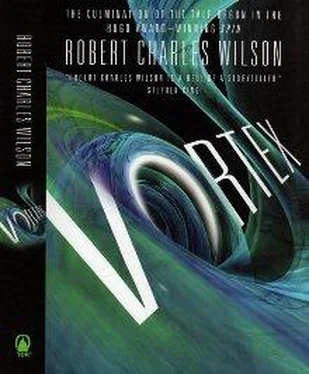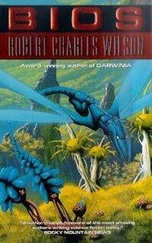I had first met Turk in the Equatorian desert, before he or I had passed through the temporal Arch. Out of ignorance or spite, and not quite by accident, Turk had once killed a man, and he had built a life on the foundation of that guilt. His best acts were acts of atonement. His failures he accepted as a kind of punishment. He craved a forgiveness he could never earn, and he was horrified when the Coryphaeus offered him that forgiveness. Accepting it would have dishonored the man Turk had killed (who was named Orrin Mather); and the people of Vox, by submerging all such feelings in their closed limbic collectivity, had made themselves monstrous in Turk’s eyes.
Allison was a different case. She was a native of Vox whose artificial persona had allowed her a rare glimpse beyond the boundaries and limitations of her life. By adopting that persona as her own, she had successfully liberated herself from the Coryphaeus. The liberation had come at the expense of her family, her friends, and her faith.
It was a bargain I understood very well.
I wanted these two people to survive. That was why I abetted their escape. Even then, I had doubted they could successfully cross the failing Arch. But I made it possible for them to live a little longer, depending on how you measure time.
* * *
For more than a millennium the Hypothetical machines had been scouring the surface of the Earth, dismantling and interpreting and remembering the ruins of the civilization we had built on the planet that gave us birth.
There was no conscious will behind this act of scavenging, no thought, no agency. It was simply behavior that had evolved over time, like photosynthesis. The devices Turk had confronted on the Antarctic plain had accumulated a rich storehouse of data. Earth’s tangible resources—rare elements that had been refined by human activity and concentrated in the wreckage of our cities—had already been extracted and transferred to orbit and beyond, where the space-faring elements of the Hypothetical ecology had feasted on them. The Hypotheticals were very nearly finished with the Earth.
But their sensors (orbital arrays of devices no bigger than grains of dust, complexly networked) had detected Vox as soon as it crossed the Arch and directed ground-based scavengers toward it. What the Voxish prophecies had imagined as an apotheosis was just a mopping-up exercise: the last berry plucked from a barren, dying bush.
The Hypotheticals arrived not long after Turk and Allison had fled, as a cloud of insect-sized disassemblers. They were sharp-toothed and efficient. They exuded complex catalysts that unzipped chemical bonds; they came through the melting walls like smoke, followed by the toxic external atmosphere. Gusts of poison blew down the corridors and walkways of Vox Core. This was a mercy, in a way—most of the citizens succumbed to asphyxiation before they could be devoured alive.
Could I have saved them?
I hated the people of Vox for compounding my suffering by resurrecting me, but I wouldn’t have wished such a fate on them. In fact I did what I could to protect them—which was nothing.
I was lucky to be able to save myself.
* * *
Of course I was protected in the most basic sense. Like Turk, I had passed through the temporal Arch. For ten thousand years I had been a memory in the archival functions of the Hypotheticals, and they had re-created me in the Equatorian desert because that was the business of the temporal Arches: to faithfully reconstruct certain information-dense structures so that the data they contained could be used to correct errors that might have crept into local systems. It was a homeostatic mechanism, nothing more.
The disassemblers wouldn’t touch my body because I had been tagged as useful. But that protection would be worthless if Vox dissolved into its component molecules. I needed to be able to exercise conscious control over what the machines were doing.
My best opportunity lay with the Coryphaeus. The processors that constituted the Coryphaeus were heavily protected. Even the nuclear detonation that had brought down the Network had not destroyed these devices, only damaged their interface with the physical world. The disassemblers would surely devour them, but not until most of Vox Core had been pulled apart. Much of my consciousness was already embedded in these processors. The same inhibitions that prevented the disassemblers from dismantling my body might extend to the Coryphaeus’s hardware, or could be made to—or so I hoped.
The Network began to fail as the citizens of Vox died in significant numbers, and I exploited that terrible opportunity. I used dormant processors to analyze the signaling protocols of the Hypothetical machines. I linked those protocols and signaling mechanisms into the deeply nested feedback cycles of the Coryphaeus, allowing me some measure of control.
And as Vox was sterilized of human life, the Coryphaeus became a chorus of one. I became the Coryphaeus.
* * *
Once I had decoded the procedural logic of the disassemblers, it became possible to feed them false recognition signals. They promptly abandoned the deconstruction of Vox Core. I used subtler and more potent instructions to reduce them to dormancy. They lost all organizing cohesion and fell from the air like dust.
But it was too late for the inhabitants, and nearly too late for the upper levels of Vox Core, which had been eroded to a skeletal framework of girders and fractured cladding. I was able to reseal the inner portions of the city and repair the relatively minor damage to the engine decks, using a combination of robotic devices and co-opted disassembler flocks. I allowed the disassemblers to dispose of all human remains, leaving nothing half consumed.
By the time I restored the city’s lights, the corridors and tiers and plains of the city were as empty as if they had never been inhabited. The air-circulation system eventually seined away any remaining dust.
* * *
But that wasn’t all I could do, I discovered.
As I waited for Turk and Allison to return—as I hoped they would—I began to explore the newly porous borderland between the Coryphaeus and the Hypotheticals. Before long I was tapping into systems larger than the Earth itself. All Hypothetical devices were interconnected, in nested hierarchies that reached from tiny disassemblers to archival machine flocks in translunar orbit, energy-mining mechanisms in the heliosphere of the sun, signal transducers in the outer solar system, transducers circling nearby stars. All these I could now perceive and influence.
I devised filters to compress this flood of information into intelligible packets, making the secrets of the Hypotheticals small enough that I could contain them. And making myself larger in the process.
My physical body began to seem redundant, and I thought about allowing it to die. But I would need it, I thought, to interact with Turk and Allison, if and when they came back. What they found here would be difficult for them to accept, and what I planned to do next would be difficult to explain.
* * *
Over the course of their multibillion-year evolution the Hypotheticals had learned to exploit a capability they had never acquired for themselves: agency.
Agency—that is, volitional action aimed at achieving conscious ends—had arisen only sporadically in the galaxy, mostly in the climax ecologies of biologically active planets orbiting hospitable stars. Species capable of agency seldom lasted longer than it took them to overload and overwhelm their planetary ecologies. They were, as the stars measure time, an unstable and ephemeral phenomenon.
But it was just such a species that had created the self-reproducing machines that were the first progenitors of the Hypotheticals. And these blooms of organic sentience were unfailingly useful: they generated unusual information; they concentrated valuable resources in their ruins; often they launched new waves of replicators, which could be harvested or absorbed into larger networks.
Читать дальше












